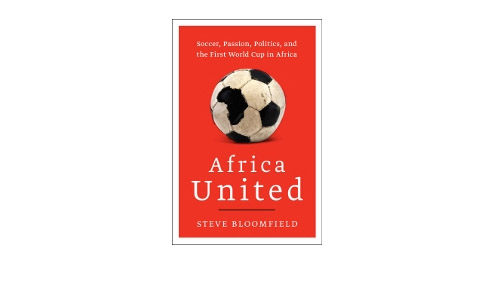Harper Perennial, 299 pages, 14.99, June
With a terse visceral intensity, Steve Bloomfield takes you along with him as he dives into politics and sporting life on the African continent, his adrenaline, as well as yours getting up equally to the thrill of a match or a dodgy situation in Mogadishu. A foreign correspondent who has covered 25 African countries since ’06, he brings his fervent passion for the beautiful game.
His elucidation of just how interwoven the politics and soccer are- i.e. corruption and regional and tribal based strife- informs the simple, yet effective narrative device he employs while surveying the 13 countries up and down the continent ahead of the 2010 World Cup (the text, while being mindful of decades of history, goes up to last June’s tournament, but is hardly a mere primer).
Each chapter begins with either an immersion into the local game- at the club or national team level- or a given country’s ruling ailments, with Bloomfield’s deft jump cutting switching the focus until we see the two topics readily coalesce.
The aftermath of a bloody battle between Chad linked Dafuri rebels and Sudanese soldiers that begins the second chapter provides one of the best examples; a soldier shouts, “we will beat them again, we will beat them again,” while waving his gun amidst a throng of cohorts and pointing towards Sudan’s national stadium in the distance, alluding to a match that FIFA judiciously had the two sides play elsewhere.
The frenetic country-to-country pace has the feel of a 007 or Indiana Jones film and while Bloomfield seems to be along for the thrill as much as we are- eating seafood and downing beers on a hotel roof deck in war torn Mogadishu is a badge of honor and he seems a bit crestfallen upon arriving in the Sudanese capital of Khartoum a few days after the aforementioned attack on the neighboring city of Omdurman- what emerges more and more with each chapter, as the despots seem interchangeable and the suffering all the more heart wrenching and senseless, is the inherent necessity of such reportage. After all, American readers are reminded several times of our impact on the continent during the good old Reagan years when we’d prop up mass murderers in the name of keeping the continent from going “red.”
So to complement his expert building of tension and exhilarating match descriptions, there are the calm moments where consciousness begins to transfer as Bloomfield bears the weight of proximity with the friends he makes along the way. His experience enables him to feel the need to “raise one’s flag” and to recognize the salve, the hope provided by a match that can transcend the respective economic and political realities.
His writing captures the rhythmic beauty of movement of players in the Liberian amputee league. Amidst the stunned notes that abound in passages about Liberia and Sierra Leone’s former child soldiers, a glaring call for the world’s attention is coupled with prayers of hope.
In a surreal moment, overlooking the beach from a blown out building in Mogadishu, he scoffs when his contact proposes a business partnership. Farah having returned to his home country to have his dream of peace shattered, details his dream of opening a seaside restaurant, something spectacular to provide for his expatriated family. “When it’s safe,” Bloomfield finally agrees, feeling the gravitas of the moment. Returning to street level, he is reminded of how simple that transition could be- he is surprised to see a series of games along the streets of one of the most dangerous cities in the world.


I’ve read this post and if I could I wish to suggest you some interesting things or suggestions.